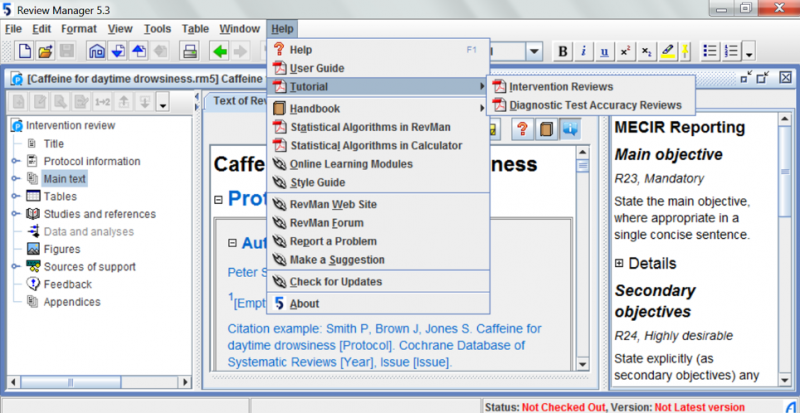In this blog for new Cochrane Review authors, Professor Anne-Marie Bagnall and Dr Nicola Lindson, who facilitate Cochrane UK's Review Author 1 and 2 training workshops, share some online and existing resources that are available to help you get started with writing your review protocol.
This month, we would normally be looking forward to delivering the first two workshops in the free face to face training that Cochrane UK hold at their Oxford HQ for new Cochrane authors. These workshops provide the information and support needed to plan and draft a Cochrane Review protocol. We do this several times a year and it’s always really enjoyable for us trainers. Not only is it a welcome chance to have a short break from our everyday work, we love to meet you and hear about all the new reviews and, increasingly, new updates to old reviews that you are doing. We always learn several new things about the various clinical problems that you are tackling, and you always have some challenging questions for us!
However, due to Covid-19, we’ve had to cancel the face to face workshops in May 2020, so we want to share with you some of the online and existing resources that are available to help you get started with writing your review protocol.
Cochrane offers free online training to new reviewers in the form of interactive learning modules. We have started asking people attending the face–to-face training to complete modules one “Introduction to conducting systematic reviews” and two “Writing the review protocol” before they arrive. Then during the workshops, we cover most of the content in these modules, as well as module three “Searching for Studies” and module four “Selecting studies and collecting data”, and some from module five “Introduction to study quality and risk of bias”. Therefore, in the absence of the face-to face training we would recommend working through modules one to five at least before completing your protocol. Module one is free for anyone to do, but all the other modules are only free for registered Cochrane members, including authors. If you are having trouble accessing modules two onward then access the interactive training guidance here.
Much of the content of these online modules is based on information from the new edition of the Cochrane Handbook (updated this year). The Handbook is an extremely valuable resource to refer to when drafting your protocol – it’s basically an encyclopaedia of systematic reviewing methods. In particular Chapters two and three are focused on determining the scope and inclusion criteria for the review, which are critical steps in the whole systematic reviewing process.
A new addition to the Cochrane Handbook is the recommendation to develop a logic model for your review. Logic models can be a useful way to organise your thoughts around what the intervention is, who the population are, how the intervention leads to the outcomes of interest, are there any intermediate outcomes, and what else - other than the intervention your review is looking at - might have an impact on the effects reported in trials. We spend most of workshop RA1 thinking through our review inclusion criteria, including drawing a logic model. Here is a useful guide from the Cochrane Infectious Diseases Group about how logic models can inform your review.
Other valuable Cochrane resources to keep referring to whilst working on your protocol are the Methodological Expectations of Cochrane Intervention Review (MECIR) standards and the Cochrane Style Guide. The MECIR standards provide information about what is expected to be included in each section of the protocol, and the more closely these are adhered to from the start the less work will be required later at the editorial review stage. The style guide gives detail on formatting style of Cochrane Reviews and the thing that you will probably need to be most aware of is the information on how to format references, which is laid out clearly for each different publication type.
The two types of software that Cochrane use most frequently and you will need to be aware of when drafting your protocol are Archie and RevMan (RevMan 5 or RevMan Web).
- Archie is an Internet-based server which stores Cochrane Protocols and Reviews and associated documents (e.g. peer review comments). It is also used by Cochrane Review Groups to manage editorial workflows, and stores the contact details of our contributors (e.g. authors, peer reviewers, editors etc).
- RevMan is the software used to write and edit Cochrane Protocols and Reviews. RevMan 5 is the traditional desktop version and can be downloaded free of charge. However, a web-based version (RevMan Web) is currently in development, which does not require a downloaded. When starting out please ask your Cochrane Review Group which version of RevMan they would prefer you to use.
If you are using RevMan 5 then you can follow this link to find a very quick crib sheet on how to get started with Archie and RevMan 5. There is also a tutorial available in RevMan 5 that you can work through to acclimatise yourself to the software. You can access it through the ‘Help’ menu (see screenshot below).

Alternatively, if you are advised to use RevMan Web by your review group then there are videos available on YouTube that show you around the software here and here.
There are also a wealth of resources available on the Cochrane training website. Including upcoming live webinars on a range of subjects, as well as an archive of previous webinars, slide casts and collections of written resources. These resources should provide you with lots of the information you need to be able to get started and draft your protocol. However, if you do have any questions or need advice specific to your topic area then please contact your Cochrane Review Group who will be happy to help.
Written by Professor Anne-Marie Bagnall (Professor of Health and Wellbeing Evidence), Centre for Health Promotion Research, School of Health and Community Studies, Leeds Beckett University (bottom left) and Dr Nicola Lindson (Managing Editor and Senior Researcher), Cochrane Tobacco Addiction Group, Health Behaviours Group, Nuffield Department of Primary Care Health Sciences, University of Oxford (bottom right).


